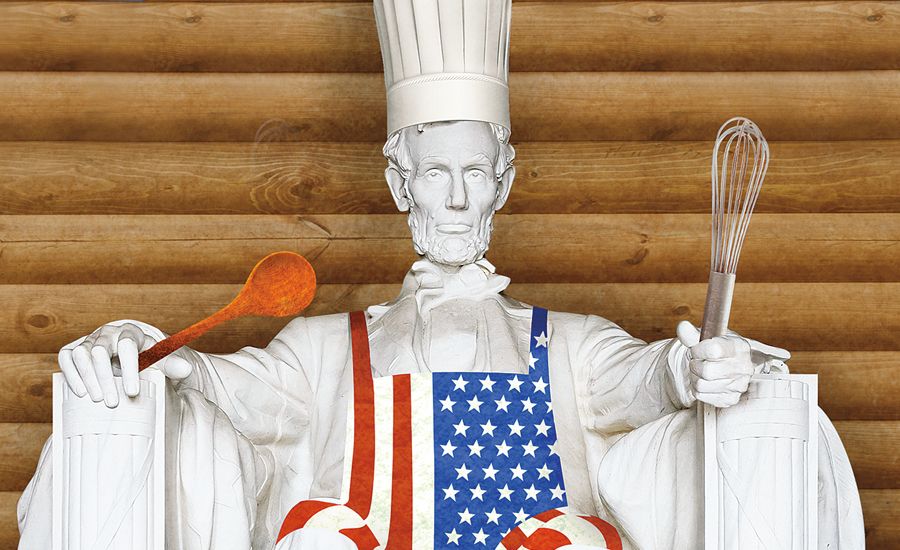I’m a food historian—part cook, part sleuth. I’ve researched and written about everything from Victorian desserts to favorite recipes of 1950s housewives. In 2008, with the two hundredth birthday of Abraham Lincoln coming up the next year, my husband idly asked, “Did you ever wonder what Lincoln ate at Thanksgiving?”
It got me thinking: What did our sixteenth president eat? No sooner had I thumbed through an old book from my husband’s shelves than I discovered something even more tantalizing. Abraham Lincoln cooked—and cooked a lot. According to one Springfield, Illinois, neighbor, back in his lawyer days he would come home from the office, put on a blue apron and help his wife, Mary, make dinner for their boys.
What if I compiled a book of recipes that re-created, to the best of my ability, what Lincoln ate and cooked? It should only take a few months. A perfect way to commemorate his bicentennial!
I was off and running, going through 1850s grocery ledgers, digging deep into the historical record, trying out hundreds of recipes from nineteenth-century cookbooks, always looking to see how they might be adapted to modern kitchens.
You probably know that Lincoln was born in a log cabin in Kentucky. But from age 7 to 21 he lived in Indiana. His father wanted to make a new homestead for his family in a free state rather than compete with farmers who used slave labor. Here in another one-room cabin Lincoln essentially grew up in the kitchen, and like all pioneer-era children had an understanding of how to cook the basics.
In early December I visited the foundation of the cabin and the hearth that still stands. I could imagine the young Abe helping his mother, Nancy, stir the big cast-iron pot, and later, his stepmother, Sarah, prepare meals over the crackling fire.
Soon I was poring over old newspapers, magazines, journals and historical records. The National Park Service staff at Lincoln’s boyhood home generously answered my many questions, as did the curatorial team at his Springfield house.
In 1831, Lincoln was hired to pilot a flatboat of grains and vegetables down the Mississippi to New Orleans. “Abe was elected cook,” his cousin and crew member, John Hanks, wrote.
Their meals had to be simple, cooked from inexpensive ingredients that were easy to bring along or pick up as they traveled—cornmeal cakes, catfish and hearty sour-milk biscuits. I found a recipe for the biscuits and made a batch for my husband and me. One bite and I could tell how the dense biscuits would sustain the pilot and crew on their river voyage.
The next year, Lincoln was a volunteer in the Illinois Militia during the brief Black Hawk War. As a fellow volunteer wrote, “We ground our coffee in the same tin cup with the hatchet handle—baked our bread on our ramrods around the same fire—ate our fried meat off the same piece of elm bark,” a vivid description of kitchen utensils on the frontier.
One day the troops ran out of rations. In an abandoned barn they found some scrawny chickens and a hog jowl. Lincoln and the others thought to cook the chickens over the fire with the hog-jowl drippings. I improvised a version of this, albeit with a store-bought fowl, presumably a lot more tender than the bird those soldiers found. I call it bacon-basted militia chicken. And it’s true, everything tastes better with bacon.
In Springfield the young lawyer and father did his share of the shopping. A neighbor described how on winter mornings Lincoln “could be seen wending his way to market with a basket on his arm and a boy at his side.”
He also supplied the fuel for the kitchen stove, and is described in the sort of imagery we often reserve for him in his log-cabin days. As a Springfield resident wrote, “I heard an ax ring out at Lincoln’s. Saw Mr. Lincoln in his shirt sleeves cutting wood—I suppose to cook his supper with.”
He certainly had an affinity for apples. His law partner William Herndon, one of the first to document the president’s life, recalled the unique way Lincoln ate an apple.
“He disdained the use of a knife to cut or pare it. Instead he would grasp it around the equatorial part, holding it thus until his thumb and forefinger almost met, sink his teeth into it and then unlike the average person, begin eating at the blossom end. When he was done he had eaten his way over and through rather than around and into it. I never saw an apple thus disposed of by any one else.”
Remember my original goal of finishing my book in a few months, in time for Lincoln’s two hundredth birthday? It took me a lot longer—six years. That’s how fascinating the research was—unearthing obscure documents, following Lincoln’s trail from Kentucky to Indiana to Illinois and ultimately to our nation’s capital. Wherever I went I sought recipes for dishes he might have eaten or cooked, and I taste-tested all of them myself.
It has often been said that Mary Todd courted the future president with a cake, proving of course that the way to a man’s heart is through his stomach, even after a broken engagement.
I found two authentic recipes for this cake and made them both. The easier version is an almond pound cake from an 1839 cookbook called The Kentucky Housewife, a logical choice, since Mary was raised in Kentucky. Made with ground mace, ground almonds, almond extract and lemon zest, this cake has a rich, buttery flavor. When you eat it, I assure you, you’ll get a taste of history.
More than once Lincoln said that a man should eat and drink only what is conducive to his good health. When I picture our sixteenth president I see him with his well-worn Bible on his lap, eating an apple in his own unique way and not wasting one bite.
Try Rae’s recipes for Almond Pound Cake and Abe’s favorite Gingerbread Men!
Download your FREE ebook, True Inspirational Stories: 9 Real Life Stories of Hope & Faith.






